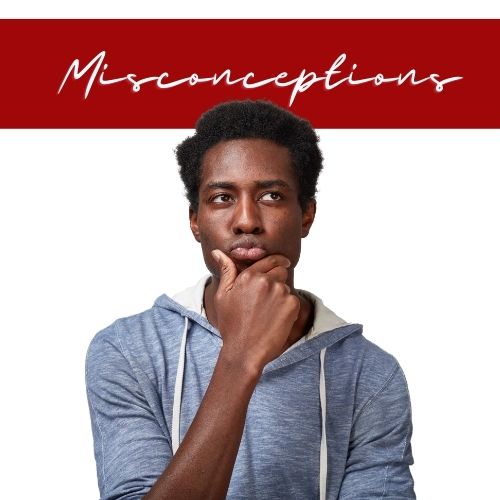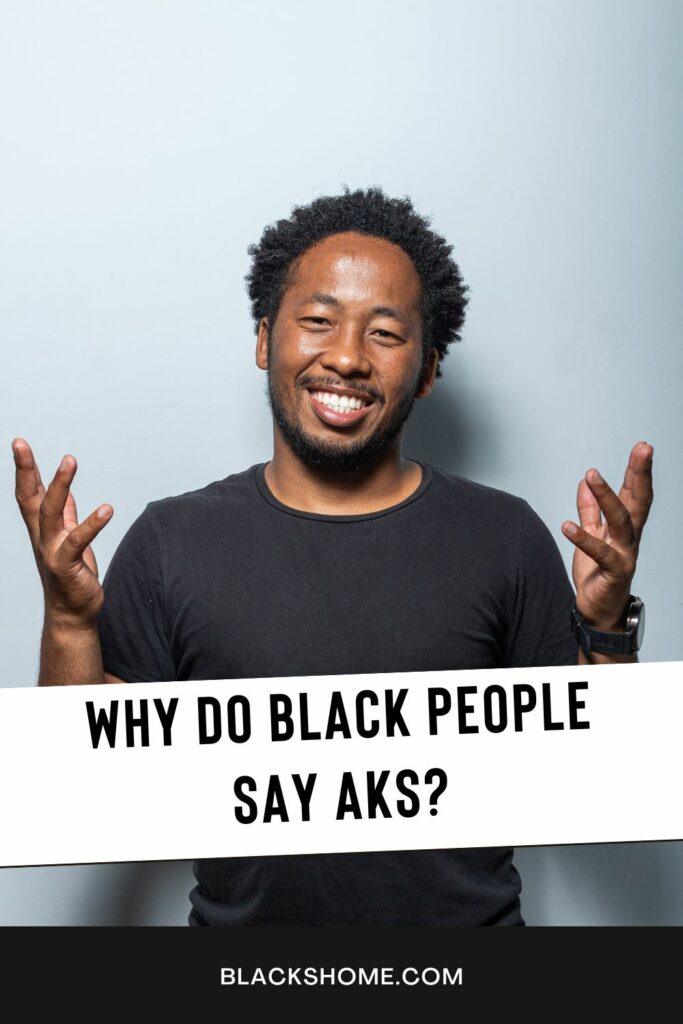It is important to know that as far as English goes, ‘aks’ is a perfectly normal thing to happen to a word like ‘ask.’ Pronouncing ‘ask‘ as ‘aks‘ was popular in New England and was used primarily by uneducated people, including black slaves. Unfortunately, it became stereotyped as exclusive to black people.

‘Aks’ is like a chord in the form of a word, an integral part of a black being, which is why black people can easily make fun of it. However, nothing stops people from hearing ‘aks’ as an illiterate word.
As soon as a black speaker gets too comfortable and articulate, they are likely to say ‘aks’ as ‘ask,’ which immediately makes them sound ignorant to anyone who hears.
Over time, words change and we will never know why ‘aks’ lost out to ‘ask.’ However, as linguistics professor John McWhorter says, ‘we know that the people whose English was designated as standard were among those who pronounced ‘ask’ correctly, and the rest remains history.’
Also Read: Why do Black People Have Big Lips?
The Origins of ‘Aks’
Let’s learn more about the root of the term ‘Aks’

1. Historical Background of the Term
‘People who use the ‘aks’ pronunciation are using the pronunciation that has been handed down, in an unbroken form, for a thousand years,’ says Jesse Shiedlower from the American Dialect Society to NPR.
Over a millennium ago, ‘Aks’ was discovered to have origins in Old English and Germanic, especially in a formal written form. It is said to be gotten from the Middle English form “acsian” and was later used by Chaucer and later Queen Elizabeth I.
As time went on, various standard English speakers chose the variation ‘ask’ over ‘aks’, and only people in the rural and isolated areas retained ‘aks’ as a dialect of English. One major reason for its continuation in the dialects of the British Isles, Appalachian English, and AAVE is because of its adaptation by people to these dialectal varieties.
Also Read: Why Do Black People Have Big Noses? [MUST READ]
2. The Origins of the Term in West African Languages
The “s” and “k” being interchanged in “aks” and “ask” is an example of what linguists call metathesis. The word “ask” comes from the Proto-Germanic word “aisk” which evolved into the Old English word “ascian.” Today, “aks” is also found in varieties of English, including Multicultural London and African American English.
This dialect is drawn from contact between different dialects of English and immigrant languages. However, according to Stanford University linguist John Rickford, a lot of these language varieties are learned in people’s homes. A linguist will not recommend you get rid of your vernacular, because you need it, especially for your soul.
3. Similarities to Other Dialects
Standard languages are derived when a certain dialect is used in written form, usually in a broader area than that of the dialect itself. If a standard language that was originally based on one local dialect changes, with time, elements of other dialects can infiltrate it.
The Linguistics of ‘Aks’

1. Explanation of African American Vernacular English (AAVE)
African American Vernacular English (AAVE), also known as Black English Vernacular, is a form of Black speech that distinguishes itself from standard English with its unique pronunciation, vocabulary, and grammatical structure. AAVE has been a topic of discussion for many public debate teams, as it is quite difficult to determine how many people speak AAVE.
Some people may use unique pronunciation and vocabulary, but it doesn’t mean that any of the grammatical features match the variety. One may prefer to use the term AAVE for varieties by the occurrence of certain unique grammatical features, but it may still be difficult to point out how many people speak AAVE.
2. Comparison of AAVE to Standard American English (SAE)
When it comes to vocabulary, AAVE is not different from other varieties of English. However, AAVE speakers may use some English words in ways that differ from Standard American English. More so, several words used in standard American English may have their origin in AAVE or in the West African languages which is a major part of AAVE’s development.
3. Linguistic Explanations for the Use of ‘Aks’ Instead of ‘Ask’
There is no scientific or logical claim of dialects being correct at all times. Research shows that linguistic prejudices, whether unintentional, non-standard, regional dialects, and against immigrants, have hindered generations of children from achieving their best in the educational system, and even beyond. Children who say “aks” are usually tasked with activities to help them distinguish between how they speak and write, but it is never the same for children who grow up speaking standard English. This drives inequality from generation to generation.
Misconceptions About ‘Aks’

1. Common stereotypes and misconceptions about AAVE
As earlier mentioned, AAVE has been a recent topic of debate in the media and is one of the many aspects of Black culture that are misinformed, putting a lot of people in confusion about it.
The discrimination Black people have received for speaking AAVS is why it is seen as a problem, a platform non-Black people profit from. A lot of non-black stars and media personalities are accused of using AAVE to gain fame, as it makes them seem either funny or cool. It further ignores the history behind AAVE and does not acknowledge the originators, Black Americans.
Black people in America are also racially viewed on the idea that they are inherently lazy, uneducated, or poor. However, not all blacks are stereotyped in this way, which has stigmatized the use of AAVE as an unprofessional or ignorant act.
2. The Importance of Understanding and Respecting Different Dialects
A person’s dialect or language is the background of their identity, as well as the foundation on which their sense of self-worth belongs. Taking time to understand and respect a person’s dialect is the same as respecting their culture, which also means appreciating its diversity, uniqueness, and value.
3. Acknowledgment of the Diversity Within the Black Community
Members of the Black community have varied histories in the nation and many are descendants of enslaved people or recently arrived immigrants. The Black nation also has diverse languages and racial identities that affect intermarriage and migration. While many structural barriers may keep black people from achieving more, it would be unreasonable not to recognize the accomplishments of black people.
Also Read: Black People Statistics You Probably Didn’t Know About!
The Significance of ‘Aks’

1. Cultural significance of AAVE
AAVE is a major part of the black people and has a long history for their language. When people speak AAE, they get familiar with a system of words, sounds, sentence structure, and structural organization of vocabulary items and other information. AAVE was created as a communication system by Black people and remains unintelligible to white speakers. This experience with Black people has resulted in common language practices in the African Diaspora, which is of huge cultural significance.
2. The Role of Language in Shaping Identity and Community
Language is a major key to expressing one’s culture, as well as a means of communicating values and beliefs. It’s an important way to improve the feelings of group identity and togetherness. With a common language, traditions, and shared values can be preserved and conveyed from one generation to the other.
3. Connection to the Broader History of African American Culture and Language
The African American community and identity have created a heritage found in language, art, music, cuisine, art, and many cultural areas. These shared cultural practices of the various African ethnic groups have only made a powerful impact on the culture of enslaved African Americans.
Use your Favorite Pin!


Your turn…
It is important to note that the use of “aks” instead of “ask” is not exclusive to Black people, as people from other backgrounds also use this pronunciation.
The example of “aks” clearly demonstrates the groundless, unreasonable, and harmful influence of concluding that any form of English is to be “correct”.
English is a form of dialect on its own, as well as any other pronunciation or form of language, and in no way is wrong.
Read Related Articles:
- Are Black People Ugly?
- Are Black People Dumb?
- Why Do Black People Not Tip?
- Why do Black People Get Ashy?
- Why Don’t Black People Get Lice?
- Why Do Black People Have Big Butts?
- How Many Black People are in Russia?
- How Many Black People Live in Montana?
- How Many Black People Have Won Survivor?
- Are Black People Stupid? All you Need to Know!
- Why are Black People Faster: Uncovering the Science of Black Speed!
- Why are Black People so Loud: Deciphering the Black “Energy”: Why We’re Louder!
